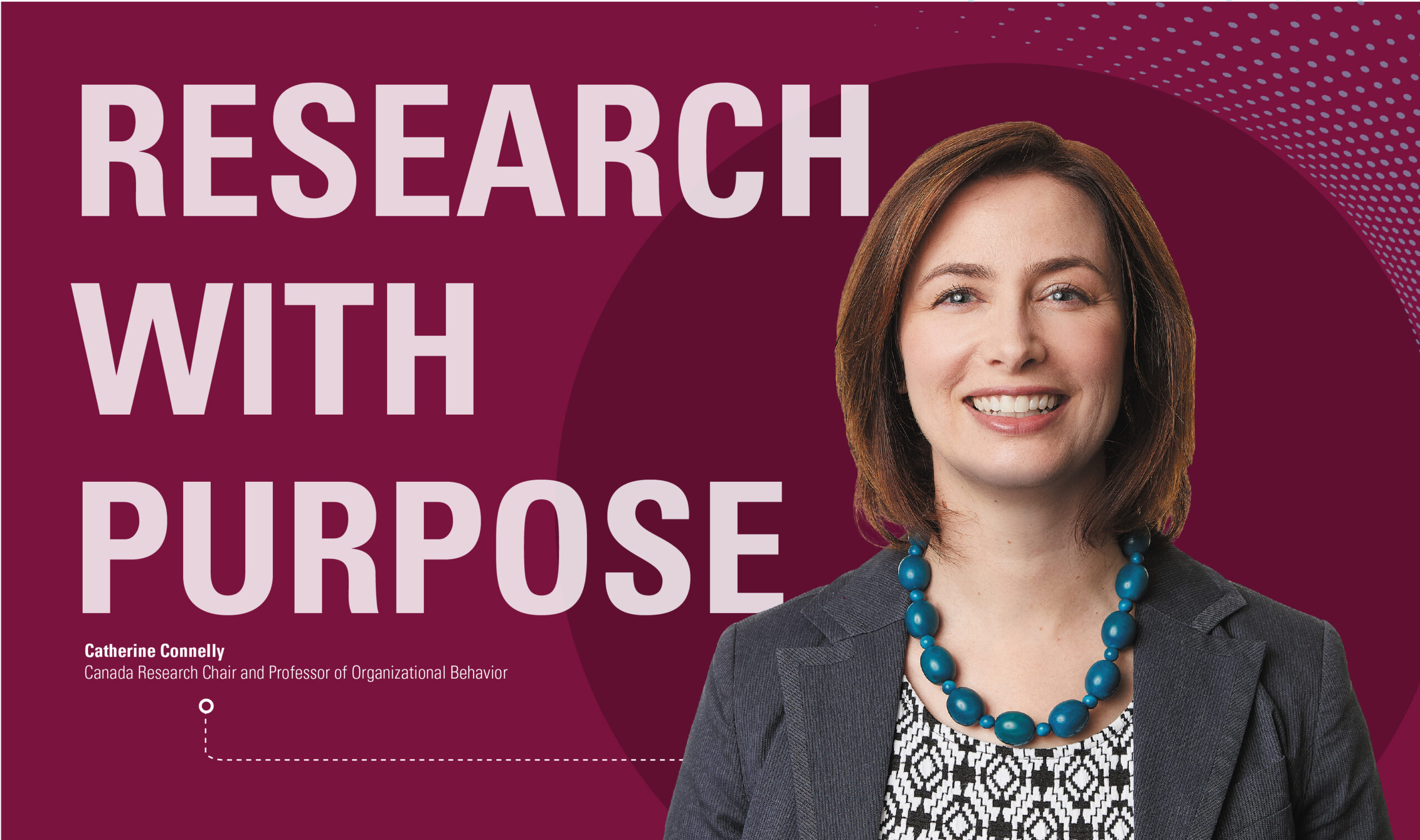Finding the evidence to change behaviour
Contributed by Kelly Anderson, DeGroote Contributor
 Catherine Connelly is a leader in the research world. She holds a Canada Research Chair in Organizational Behaviour and founded the Connelly Research Lab in Organizational Behaviour at the DeGroote School of Business in 2013. She’s also a Member Emeritus of the College of New Scholars of the Royal Society of Canada – a highly esteemed honour. Her research has been featured in the New York Times, the Globe and Mail, the Toronto Star and on TV and radio across Canada.
Catherine Connelly is a leader in the research world. She holds a Canada Research Chair in Organizational Behaviour and founded the Connelly Research Lab in Organizational Behaviour at the DeGroote School of Business in 2013. She’s also a Member Emeritus of the College of New Scholars of the Royal Society of Canada – a highly esteemed honour. Her research has been featured in the New York Times, the Globe and Mail, the Toronto Star and on TV and radio across Canada.
But what drives her is the evidence.
Catherine studies how workplaces are changing and how employees are reacting to those changes. In particular, she focuses on the attitudes and behaviours of workers whose experiences are a little outside the ordinary – temporary foreign workers, contractors, part-timers, gig workers and those with disabilities, among others. She also dives deep into leadership and the effects of knowledge hiding in organizations.
“So much of our culture and the data we have about workplaces is based on the idealized worker – the one who works 9-5 and has one job for their whole career. I never saw myself or anyone I know represented in that picture. And when I looked, other types of workers did not show up in the data. It continues to perpetuate the old idea of what work is, and I don’t agree with that. I knew we needed more evidence in order to change things.”
Catherine believes that evidence is the only way to change people’s minds about how to behave, especially in the workplace. “Employers need to feel confident about their decisions. When the evidence can disprove common misconceptions and show that a different path can be beneficial, behaviours and policies are changed.”
That’s exactly what has been happening thanks to Catherine’s recent paper, “Building the ‘Business Case’ for Hiring People with Disabilities.” Published in the Journal of Business and Psychology in 2020, it’s been downloaded over 100,000 times. “That kind of reach is amazing. It means people are listening. There has been a common reluctance among managers to hire people with disabilities because they think it will be more work. But the evidence shows that’s not the case. One company we did a quantitative cost analysis with found slightly above average value from employees with disabilities – not only in their productivity but also because they are loyal, with little turnover. From a research standpoint, working with this kind of data from large multinational companies is very interesting – and it’s absolutely practical for the employer.”
Catherine did her undergraduate commerce degree at the DeGroote School of Business and became interested in research through conversations with professors. “At that time, I had no idea you could even do research for a living,” she laughs. “One of my professors encouraged me to go on to graduate school and get a PhD so I could do my own research.” She did just that at Queen’s University with a double major in organizational behaviour and management information systems. “I’ve always liked interdisciplinary topics.”
Catherine made a beeline back to McMaster after her PhD because she loves the environment on campus and the emphasis on research. She says she had early successes in her career because she just loved doing research – even as a hobby in her spare time.
Now, in the Connelly Laboratory, she has two staff members and up to eight students working with her. “The world of work has changed over the years and continues to change quickly. Early on, some of my first papers were on temporary agency workers. Now we study gig economy workers, like Uber drivers. Our newest study is on musicians – the original gig workers – who cobble together income from many sources and need to be not only artists but marketers and brand specialists.”
Catherine has a large national and international network of peers and clients and is often asked to collaborate on projects with many universities and organizations. She’s known to be a master relationship builder, and says she loves working with so many different people. But when it comes down to it, it’s the research itself that ignites her.
“My favourite part is when an idea sparks and we can put together a new project. The studies are all long-term, but seeing them coming together and have an impact is very satisfying. Gathering and presenting evidence is important work, and I’m thrilled to be able to do it.”


Comment Policy
We generally welcome discussion on our blog posts. However, we reserve the right to edit or delete comments in certain situations:
This site is moderated by the DeGroote Marketing and Communications team. If you have any questions please email Katie Almas.